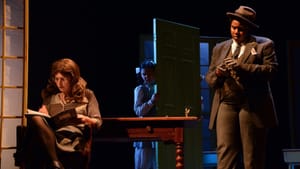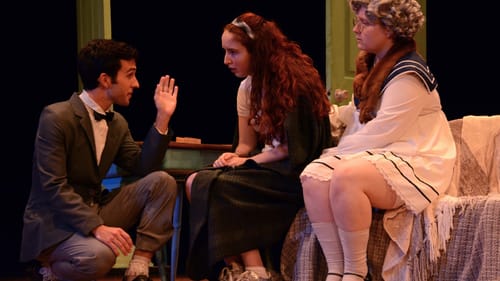Stay in the Loop
BSR publishes on a weekly schedule, with an email newsletter every Wednesday and Thursday morning. There’s no paywall, and subscribing is always free.
The kids are (not) all right
Princeton Summer Theater presents Lillian Hellman's 'The Children's Hour'

Lillian Hellman’s The Children’s Hour remains surprisingly ahead of its time, even 85 years after its premiere. The playwright’s frank exploration of muted lesbian desires, class-based privilege, and the power of rumor and innuendo seem prescient even by today’s standards. It’s a pity, then, that Princeton Summer Theater’s production drowns in a deluge of directorial insertions.
Director Maeli Goren clearly has ideas about Hellman’s play, described in her program notes as presenting “a world obsessed with how to be good: how good people look, dress, grow up, speak, love.” Yet her interpretation relies on theatrical flourishes that either remain unsupported or contradict the repressive, imposing atmosphere the drama requires.
Secrets and lies
The world of the play, the Wright-Dobie School, is an enclave of wealth and entitlement. Teachers Karen Wright (Lydia Watt) and Martha Dobie (Allison Spann) have burnished Wright-Dobie’s reputation through hard work and self-sacrifice, and they endeavor to educate their girls beyond the usual finishing-school instruction.
In their zeal, they run afoul of Mary Tilford (E Harper Nora Jerimijenko-Conley, whose name is more theatrical than her stage manner). The willful charge of an influential family, she makes it her mission to destroy their lives.
Mary claims Martha and Karen are engaged in an ongoing relationship, which marks them as unsuitable chaperones for girls of good breeding. The town turns against them, buoyed by the indignant crusade of Mary’s respected grandmother (Maeve Brady).
Despite some reservations about how Hellman presents queerness — as it becomes clearer Mary’s invented story isn’t entirely fiction, Karen and Martha begin conforming to tragic lesbian archetypes, their lives bound for misery and destruction — I still marvel at what she managed to put onstage in 1934. The material here often seems stronger and less histrionic than her oft-revived The Little Foxes, the characters more believably human.
Girl talk
Based on Goren’s production, I doubt she feels similar confidence in Hellman’s text. Many of her choices seem theatrical for their own sake, like using a life-sized ventriloquist’s doll to represent one of the students. She also has the production’s sole male-identified actor, Evan Gedrich, play a girl, which he does by loading on a host of breathy cliché.
When Gedrich segues to the male role of Karen’s fiancé, Dr. Joe Cardin, his costume (designed by Julia Peiperl) remains self-consciously feminine, right down to a pair of frilled bobby socks. If the intent here is to investigate the performance of masculinity — or suggest that Joe, who stands by Karen even after she’s accused, can be read as a queer figure — it feels a bit on the nose. Either way, Gedrich is thoroughly bland.

The production further explores gender through its characterization of Mrs. Lily Mortar, Martha’s aunt, a former actress who teaches speech and elocution at the school. Chamari White-Mink plays the character dressed in a three-piece suit, with fedora, leather gloves, and an ever-present pipe. As a proudly theatrical person, it makes sense that Aunt Lily wouldn’t conform to societal norms, but presenting the character as beyond the binary raises questions of narrative believability.
Would the school’s conservative parents — who all send for their girls the moment Mrs. Tilford floats the rumor of Karen and Martha’s relationship — tolerate the presence of a woman who dresses in masculine attire? If the world of Hellman’s play rests on how people present themselves, would this not raise an eyebrow?
Sense and sensibility
Other ideas make more sense. The casting of Brady as both Mrs. Tilford and a schoolgirl reinforces the idea that the children of today will grow into adults who wield considerable social power. But having Brady sing “Stormy Weather” during a scene change while changing into her old-lady drag in view of the audience feels like theatricality for its own sake.
That same sense of performative self-consciousness pervades the presentation of Karen and Martha, the latter of whom also gets her own cabaret number (“All of Me,” natch). Watt largely overcomes this with refreshing naturalism, but Spann occasionally sinks too deep into the melodrama.
Other regrettable mistakes include a busy soundscape (by Naveen Bhatia) evoking horror-movie clichés and soap-opera excess, and the presentation of Mary as a charmless sociopath straight out of The Bad Seed. Unlike Adrienne Mackey’s fine production of this play for EgoPo Classic Theater three seasons ago, Goren shows no interest in subtlety or ambiguity, and the overall impact seems far weaker for that.
The Children’s Hour ends with the realization that callousness and panic can ruin or end lives. In many ways, it prefaces the anticommunist witch hunts of the 1950s, during which Hellman famously said she “cannot and will not cut my conscience to fit this year’s fashions.” It’s a play that offers a sentiment and warning still much needed today.
Would that this production seemed interested in telling that story.
What, When, Where
The Children’s Hour. By Lillian Hellman, Maeli Goren directed. Princeton Summer Theater. Through August 5, 2018, at Hamilton Murray Theater, Murray-Dodge Hall, Princeton University, Princeton, New Jersey. (732) 997-0205 or princetonsummertheater.org.
Sign up for our newsletter
All of the week's new articles, all in one place. Sign up for the free weekly BSR newsletters, and don't miss a conversation.

 Cameron Kelsall
Cameron Kelsall